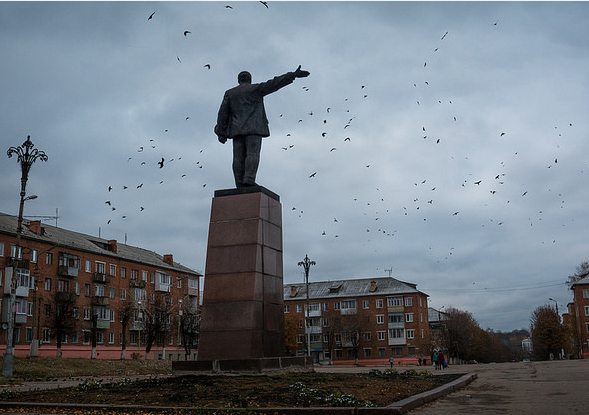Russia’s October Revolution, 100 years later
Posted By Jacqueline Westermann on November 7, 2017 @ 13:48

A century ago today, Lenin’s Bolsheviks stormed the Winter Palace to replace the social-liberal interim government of Russia that was established after the February Revolution. The coup was dubbed the October Revolution because it took place on 24–25 October in the Julian calendar. According to the Gregorian calendar, though, which Russia adopted in January 1918, it was 7 November.
A hundred years on, Russians are still debating whether it should be remembered as a positive or a negative event—and whether it should be commemorated at all. Vladimir Putin’s government hasn’t provided any clarity. The president waited until December 2016 to issue a statement [1] about the upcoming year of anniversaries. He called on historians to determine how the 1917 revolutions should be marked and whether state officials should take part in events.
The result was a committee’s plan for a year of mainly cultural and academic events to inform people about and commemorate the October Revolution. They included an exhibition in the Hermitage [2] and a series of conferences, including one [3] in Havana. The Kremlin, however, announced [4] on 25 October that it wasn’t planning to hold any official events.
The anniversary presents a dilemma for Putin. He’s averse to such revolts generally and dismissed the ‘coloured’ revolutions in Georgia and Ukraine as being orchestrated by outside powers. But the October Revolution eventually resulted in the founding of the Soviet Union, whose dissolution Putin said was the ‘greatest geopolitical catastrophe of the century’. He didn’t necessarily favour the system in the USSR, but felt it brought socioeconomic progress to its people. At the same time, he called the revolution ‘the time bomb that was planted under the structure of our statehood’ [5], referring to the drawing of borders that prevented unity and caused conflict later. Revolutions are seen by many Russians as causing ‘violence and instability’ [6].
A Levada Centre survey [7] exposes strongly differing views among Russians about the revolution.
In 2017, 9% of those polled considered the October Revolution to be ‘definitely’ legal. Another 38% said it played mostly a positive role in Russia’s history. The survey indicated that Russians seem much happier now with the direction their country is taking than they were two decades ago. In 1998, 27% answered that ‘Russia continues to develop in keeping with its own traditions and national values’. That number has almost doubled now. The proportion seeing Stalin in a more positive light has increased from 8% in 1990 to 24% in 2017. At the same time, the proportion with a positive view of Lenin dropped from 67% to 26%.
Asked what they would have done if they had been present during the revolution, a third said that they would have focused on surviving without becoming involved. In 1990, only 12% responded in that way. Only 3% said they would like to have lived through perestroika and their nation’s early economic reforms—which heralded the end of the Soviet Union. The number who said they preferred living now, under Putin, rose from 23% in 2002 to 33% now. Those results reflect a growing lack of interest in politics generally in Russia.
There’s wide disagreement among Russians about the revolution’s impact on their country. The Financial Times recently identified [8]the diverging views: communists it interviewed said they still believe in the revolution as ‘the only path’, while a religious activist dreamt of the reappearance of a tsar, and a theatre director feared violence.
When I asked members of Russia’s Generation Y what they thought, they said that they had learned about the revolution at school, but it was presented without emotion as a historical fact, without any judgement on whether its impact was positive or negative. Some believed the revolution could not have been prevented. Others held the view that it was important to learn from the circumstances that led to the revolution to prevent it happening again. One respondent said that Russians can be categorised in one of three groups: those who miss the USSR and see the revolution as something positive; those who don’t care; and those who feel that in 1917 Russia needed reforms but the method chosen by the Bolsheviks—resulting in millions of deaths [9] and the elimination of the intellectual class—was wrong.
Another Levada Centre survey [10] asked what Russians considered their nation’s most serious problems. Price increases, the impoverishment of most of the population, increased unemployment and corruption were the most chosen answers. That sounds similar to the socioeconomic issues that people were concerned about in early 1917.
So, is another Russian revolution likely? Probably not. The political situation is different. A century has seen Russia and the Soviet Union grow to world-power status, lose that status and attempt to regain it. Recent demonstrations in support of opposition leader Alexei Navalny have shown strong discontent, especially among younger Russians. A significant number of people clearly want change, but the current government has a firmer grip on power than the tsar did. And most Russians are loyal to their political leaders.
Article printed from The Strategist: https://www.aspistrategist.org.au
URL to article: https://www.aspistrategist.org.au/russias-october-revolution-100-years-later/
URLs in this post:
[1] statement: http://kremlin.ru/acts/news/53503
[2] an exhibition in the Hermitage: http://tass.ru/obschestvo/4677456
[3] including one: http://tass.ru/obschestvo/4677925
[4] announced: https://www.kommersant.ru/doc/3448971
[5] ‘the time bomb that was planted under the structure of our statehood’: http://en.kremlin.ru/events/president/news/51206
[6] ‘violence and instability’: https://theconversation.com/why-putin-is-shy-about-celebrating-the-centenary-of-the-russian-revolution-74394
[7] survey: https://www.levada.ru/en/2017/04/21/the-october-revolution/
[8] identified : https://www.ft.com/content/2043a4a8-9495-11e7-a9e6-11d2f0ebb7f0
[9] millions of deaths: https://www.newstatesman.com/world/europe/2017/10/russia-s-turbulent-century-revolutions-lenin-putin
[10] survey: https://www.levada.ru/en/2017/09/26/the-most-alarming-problems/
Click here to print.